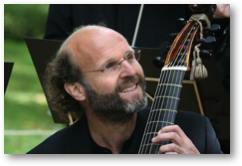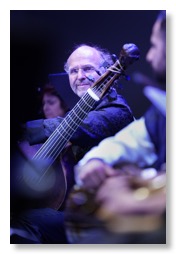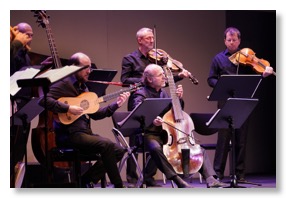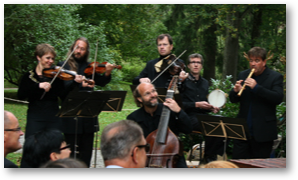
Lorenz Duftschmid
Born in Linz, Upper Austria, Lorenz Duftschmid received his first musical education at the Anton Bruckner-Privat University and at the Musikgymnasium in his hometown, where he was also a co-founder of the ensembles for early music Ars Antiqua and Consortium Musicum. During this time, Lorenz Duftschmid made intensive contacts with personalities such as August Wenzinger, Wieland Kuijken, Gustav Leonhard, Ferdinando Luigi Tagliavini and Josef Mertin. At the Schola Cantorum in Basel, Lorenz Duftschmid completed concert studies in the viola da gamba class by Jordi Savall. Since then he has traveled the world as a soloist with first-class ensembles and conductors. Lorenz Duftschmid performed on stage with artists such as Ton Koopman, Claudio Abbado, Karl Marcovics, Paul Gulda, Tobias Moretti, the Vienna Symphony Orchestra, the Berlin Philharmonic Orchestra and Sir John Eliott Gardiner, Kassé Mady Diabaté and Ballake Sissoko. He has performed in major concert halls around the world such as Beijing, Taipei, Hong Kong, New York, Boston, Buenos Aires, Montevideo, Sao Paolo, Caracas, in the Wiener Konzerthaus and Musikverein, at the Bach Festival in Leipzig, in London, Paris, Berlin, Oslo, Lissabonn, Rome and Amsterdam.
He has performed in major concert halls around the world such as Beijing, Taipei, Hong Kong, New York, Boston, Buenos Aires, Montevideo, Sao Paolo, Caracas, in the Wiener Konzerthaus and Musikverein, at the Bach Festival in Leipzig, in London, Paris, Berlin, Oslo, Lissabonn, Rome and Amsterdam.
More than 100 CD recordings, many of which have received international awards, document the artist's work. After a guest professorship at the University of Art in Graz, Lorenz Duftschmid has been Professor of Viola da Gamba at the State University of Music in Trossingen, Germany since 2003. Lorenz Duftschmid was a visiting professor at the renowned Tongji University in Shanghai from 2017 to 2019. He is considered a celebrated virtuoso on gamba, baryton and arpeggione, and is in demand as a passionate researcher in music and as an ensemble director and conductor.
Today Lorenz Duftschmid mainly performs as a soloist and with his ensembles Armonico Tributo, the Johann Joseph Fux madrigalists and AnLeuT Consort.
Numerous music festivals such as International Early Music Weeks - Krieglach, International Chamber Music Days - Raumberg, Atelier for Early Music - Montepulciano - Trossingen- Aflenz, Musiqua Antiqua - Vienna, muerz.baroque were shaped by the musical direction of Lorenz Duftschmid. In 2001 the artist was awarded the Grand Josef Krainer Prize of the Department of Styria for his cultural merits. In 2017 he performed e.g. in Carnegie-Hall / New York - USA, in China, Paris (Opéra Comique, Chateau de Versailles), London, Vienna and on the Reformation Day at the world exhibition “Luther 2017” in Wittenberg - D. 2019 in Beijing - Forbidden City Concerthall, Australia, New Zealand, Barcelona, Utrecht, Gdansk, Ambronay, Salzburg, Graz, Hamburg-Elbphilharmonie and Las Palmas. In the upcoming years there will be numerous concerts f.i. in Barcelona, Cologne, Graz, Paris, Munich, Vienna, Strasbourg, Grafenegg, Hamburg, Brugge and Versailles.
Born in Linz, Upper Austria, Lorenz Duftschmid received his first musical education at the Anton Bruckner-Privat University and at the Musikgymnasium in his hometown, where he was also a co-founder of the ensembles for early music Ars Antiqua and Consortium Musicum. During this time, Lorenz Duftschmid made intensive contacts with personalities such as August Wenzinger, Wieland Kuijken, Gustav Leonhard, Ferdinando Luigi Tagliavini and Josef Mertin. At the Schola Cantorum in Basel, Lorenz Duftschmid completed concert studies in the viola da gamba class by Jordi Savall. Since then he has traveled the world as a soloist with first-class ensembles and conductors. Lorenz Duftschmid performed on stage with artists such as Ton Koopman, Claudio Abbado, Karl Marcovics, Paul Gulda, Tobias Moretti, the Vienna Symphony Orchestra, the Berlin Philharmonic Orchestra and Sir John Eliott Gardiner, Kassé Mady Diabaté and Ballake Sissoko.

More than 100 CD recordings, many of which have received international awards, document the artist's work. After a guest professorship at the University of Art in Graz, Lorenz Duftschmid has been Professor of Viola da Gamba at the State University of Music in Trossingen, Germany since 2003. Lorenz Duftschmid was a visiting professor at the renowned Tongji University in Shanghai from 2017 to 2019. He is considered a celebrated virtuoso on gamba, baryton and arpeggione, and is in demand as a passionate researcher in music and as an ensemble director and conductor.
Today Lorenz Duftschmid mainly performs as a soloist and with his ensembles Armonico Tributo, the Johann Joseph Fux madrigalists and AnLeuT Consort.
Numerous music festivals such as International Early Music Weeks - Krieglach, International Chamber Music Days - Raumberg, Atelier for Early Music - Montepulciano - Trossingen- Aflenz, Musiqua Antiqua - Vienna, muerz.baroque were shaped by the musical direction of Lorenz Duftschmid. In 2001 the artist was awarded the Grand Josef Krainer Prize of the Department of Styria for his cultural merits. In 2017 he performed e.g. in Carnegie-Hall / New York - USA, in China, Paris (Opéra Comique, Chateau de Versailles), London, Vienna and on the Reformation Day at the world exhibition “Luther 2017” in Wittenberg - D. 2019 in Beijing - Forbidden City Concerthall, Australia, New Zealand, Barcelona, Utrecht, Gdansk, Ambronay, Salzburg, Graz, Hamburg-Elbphilharmonie and Las Palmas. In the upcoming years there will be numerous concerts f.i. in Barcelona, Cologne, Graz, Paris, Munich, Vienna, Strasbourg, Grafenegg, Hamburg, Brugge and Versailles.
Armonico Tributo Austria
Armonico Tributo, hailed by critics due to its versatility, virtuosity, and innovativeness was created in 1989 by Lorenz Duftschmid and his closest friends through their shared vision of creating a forum to address modern day cultural concerns using original instruments.
The remarkably varied repertoire of Armonico Tributo ranges from the ancient sounds of Celtic music to Middle Age, Renaissance and Baroque, encompassing Viennese classics as well. The AnLeut publishing company was created for the purpose of experimenting with contemporary music on ancient instruments.
Baroque, encompassing Viennese classics as well. The AnLeut publishing company was created for the purpose of experimenting with contemporary music on ancient instruments.
Like in Georg Muffat's collection of instrumental concerts (published in Salzburg, 1682) the idea becomes program: an inspiring concert of nations as a contribution to harmonising the world. Invitations to appear and successful performances at highly reputed festivals and the impressive take-up of the CDs, testify the growing acceptance of this vision across a wide cross-section of audiences and give added impetus to Armonico Tributo's mission of taking an adventurous journey of sound through the ages.
Armonico Tributo's production planning affords a special attention to detail. Whether in mystic original-sound installations of four, baroque slap-sticks, the complete open-air realisation of a "horse ballet" or in the interpretation of Johann Sebastian Bach's orchestral suites: mediocrity is never setting the standard and the "Armonico Tributo-effect" occurs - their passion for music emits sparks from the stage directly to the audience.
Armonico Tributo, hailed by critics due to its versatility, virtuosity, and innovativeness was created in 1989 by Lorenz Duftschmid and his closest friends through their shared vision of creating a forum to address modern day cultural concerns using original instruments.
The remarkably varied repertoire of Armonico Tributo ranges from the ancient sounds of Celtic music to Middle Age, Renaissance and

Like in Georg Muffat's collection of instrumental concerts (published in Salzburg, 1682) the idea becomes program: an inspiring concert of nations as a contribution to harmonising the world. Invitations to appear and successful performances at highly reputed festivals and the impressive take-up of the CDs, testify the growing acceptance of this vision across a wide cross-section of audiences and give added impetus to Armonico Tributo's mission of taking an adventurous journey of sound through the ages.
Armonico Tributo's production planning affords a special attention to detail. Whether in mystic original-sound installations of four, baroque slap-sticks, the complete open-air realisation of a "horse ballet" or in the interpretation of Johann Sebastian Bach's orchestral suites: mediocrity is never setting the standard and the "Armonico Tributo-effect" occurs - their passion for music emits sparks from the stage directly to the audience.

